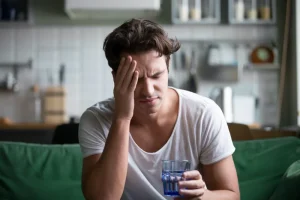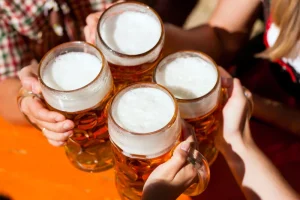
It often feels very tempting (and easy) to keep drinking until you feel better, especially when you have less access than usual to more helpful coping methods. If you already feel a little low, giving yourself a hard time for overdoing the alcohol probably won’t improve matters. Maybe you tossed and turned, had bizarre dreams, or woke up with your heart racing. Dopamine produces positive emotions that make you feel good and help reinforce your desire to drink, but alcohol affects your central nervous system in other ways, too.
Medications
Contact us to discuss depression treatment options and one of our helpful staff members will get in touch. Alternatively, fill in our depression self-assessment test and we will reach out to book a consultation with you. It’s important to remember that drinking alcohol in moderation is typically fine. But if you find yourself needing to drink more to receive the same effects, it can lead to excessive drinking and some of the health problems described above.
Increased Vulnerability

As discussed above, alcohol does not allow you https://ecosoberhouse.com/ to appropriately cope with depression, stress and anxiety, given the negative effects on your brain chemistry. It also may prevent you from seeking the help you need to manage mental health issues. Your symptoms could continue to worsen and lead to life-threatening consequences. The question that will be answered in this blog is, “Does alcohol cause depression?
Conditions

And overall mortality from any cause was also found to be lower among those who drank in moderation compared with those who never drank. There was “low certainty” that the risk of breast cancer and colorectal cancer were higher for those who drank more in moderation than those who drank less, and no association with other throat and neck cancers. Perhaps depression undermines support as many people, when depressed, isolate, thereby reducing contact with social supports (Snowden, 2001). Additionally, intensity of alcohol use could be a confounding factor that varies depending on available social supports. In sum, social support might function independently of drinking behavior among people with HIV and HCV or even promote it. In many cases, even moderate drinking (defined below) appears to increase risk.

Domains of recovery capital include physical and economic factors, such as access to food, healthcare, safety, and shelter. Social support plays a large role in recovery capital and is based on the extent to which intimate partners, family, and friends are able to support the recovery process. A growing number of studies are investigating the resources and variables that support recovery through the recovery capital lens (Hennessy, 2017). Additionally, extant data indicate that increased positive social connections increase recovery capital (Mawson, Best, & Lubman, 2016).
- When consumed, a person may have feelings of relaxation or euphoria.
- You may, in turn, continue drinking more alcohol, believing you’ll get more of a good thing.
- Depression and alcohol use disorder (AUD) are the most commonly diagnosed co-occurring disorders.
- But with the right treatment and support, most people with depression can make a full recovery.
- The next day, as these neurotransmitters return to their usual levels, you may feel depressed for a day or so.
For the present study, only baseline data are reported, which included the following measures, in addition to age, ethno-racial group, and homelessness. By contrast, another 2023 study found similar rates of death between nondrinkers and light to moderate drinkers. We are no longer supporting IE (Internet Explorer) as we strive to provide site experiences for browsers that support new web standards and security practices. When you’re hungover, you’re experiencing this rebound effect—the good stuff has tanked and the bad stuff is very present. If you are concerned about how alcohol may be impacting your life, the best thing you can do is talk to your doctor.
Alcohol is frequently used to numb uncomfortable emotions and can become a habitual pattern that disrupts the natural balance of neurotransmitters in the brain. John C. Umhau, MD, MPH, CPE is board-certified in addiction medicine and preventative medicine. For over 20 years Dr. Umhau was a senior clinical investigator at the National Institute on Alcohol Abuse and Alcoholism of the National Institutes of Health (NIH). CBT can teach you ways to modify your thoughts and behavior to feel better and help you avoid misusing alcohol. In addition, your doctor may prescribe medicines that are meant to lower alcohol cravings, which can reduce your desire to drink. People with depression frequently lose interest in activities that once brought them joy like hobbies and social events.
- What people shouldn’t be doing is justifying their drinking because it’s supposed to be healthy, says Luis Seija, an internist and pediatrician at the University of Pennsylvania.
- I call this phenomenon drinking depression; others call it hangxiety—there’s actually an entire subreddit dedicated to it.
- If you think you have a problem with either, talk to your doctor or therapist.
- All these pathways in the body are linked to inflammation and oxidative stress, says Pranoti Mandrekar, a liver biologist at University of Massachusetts Chan Medical School.
- The widespread struggles of major depressive disorder are quite serious and, without care and support, can be too overwhelming for someone to manage on their own.
Despite these limitations, this study represents an important step in better understanding the relationship between using alcohol to cope and protective factors, such as social support. Although documented in other groups, this study contributes novel findings about the relationship between coping-based alcohol use and depression among HIV-HCV patients. More broadly, this study is novel because it examined the association between coping-based use and social support. The contribution of social support to depression and alcohol use is likely nuanced and requires further examination. Emerging data show that optimizing protective factors can provide a promising does alcohol make depression worse avenue to recovery (Litt, Kadden, Tennen, & Kabela-Cormier, 2016).
To overcome these patterns, a person must be ready to change of their own accord. But if you think they will be receptive, approach the problem with empathy and nonjudgement, and be prepared to offer solutions. If they are ready, help them research their options, and discuss the best ways for you to be supportive. If you’ve been suffering from depression, and have been attempting to drink your blues away, you’re certainly not alone. Research shows that most people who abuse alcohol and enter treatment have Oxford House high scores on depression rating scales.

